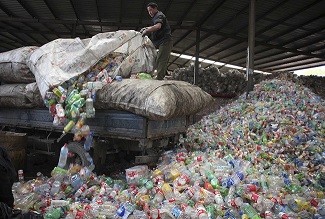China and other nations are likely to prop up demand for plastic despite economic slowdown as the drop in oil prices has made plastic manufacturing cheaper for China’s expanding online market, the Reuters reported.
The report said that although consumers are avoiding large purchases, they continue to buy cheaper items in plastic packaging.
In a country of 1.3 billion people like China, the continued demand for plastic is a blow to the efforts of green organizations to reduce and curb the use of disposable plastic bags, the report said.
However, for exporting nations such as South Korea, Taiwan and Japan with companies such as Hanwha Chemical, Formosa Petrochemical Corp., Japan Polyethylene Corporation and Japan's Prime Polymer, it is considered good news.
"(Plastic) film seems to be getting a boost from the explosion of e-commerce in China--what we call the 'Alibaba effect.' All those packages have to be wrapped," Vince Sinclair, Wood Mackenzie's head of chemicals research for Asia, said. He was referring to Alibaba Group Holding Ltd., which is leading China's rapidly growing online market.
To green groups, the growing plastic consumption is a big concern, given that plastic materials are often disposed of improperly, polluting the environment.
"Mismanaged plastic waste is an unintended consequence of rapid economic development. As incomes rise, people increasingly rely on consumer goods--and as a result, more plastic waste is generated," Nicholas Mallos, a director in U.S.-based environmental group Ocean Conservancy, said.
JP Nah, director of polyolefins for Asia at IHS Chemical, said that although growth in polyethylene (PE) consumption in Northeast Asia is expected to stand at around 6 percent in 2016, Southeast Asian growth will likely increase above 5 percent next year.
"Lower crude prices translate to lower feedstock costs for plastics," Nah noted. "Lower plastics prices not only encourage consumption but create the possibility of other products that are making use of metals/glass/paper to switch to plastics."
The report said that the growth would be further driven by India's demand for plastic piping to be used in water projects and in processed foods and soft drinks.
Nikhil Vallabhan, a consultant at Frost & Sullivan Asia Pacific, said that Indian spending on those products is expected to grow at an annual compound rate of over 11 percent from more than $12 billion in 2015.
"China still accounts for the lion's share of consumption. However, it's not the fastest growing market," Sinclair said. "It has been overtaken by India--though of course India has a smaller demand base."



























